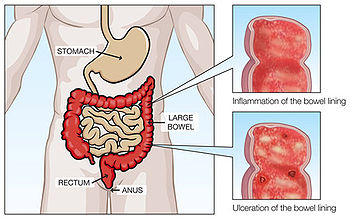Ulcerative colitis
From Wikiwel
See also :
Symptoms
- Ulcerative colitis (Colitis ulcerosa, UC) is a form of inflammatory bowel disease (IBD).
- Healthy intestinal flora bestows resistance to intestinal disorders such as constipation, diarrhea, diverticulitis, irritable bowel disease, ulcerative colitis (UC), Crohn's Disease, leaky gut syndrome, autoimmunity, and colon cancer.
Home remedies
- Sharpen up your immune system : You can help fight the mixed-up immune reactions with colitis by simply helping to make your immune system a little sharper--and that involves your gut flora. You see, having a healthy population of beneficial bacteria in your gut helps to encourage more of your immune system's natural inflammation-fighting cells to form. Plus, your friendly flora encourages the other cells in your intestinal tract to treat normal molecules as friends instead of enemies. In addition to having a healthy diet (more on that below), one of the best ways you can help your body to achieve and maintain a strong population of friendly bacteria is to take a top-notch supplement.
- Improve your digestion (See : Digestive Disorders) : Colitis is characterized by poor digestion and anything-but-normal bowel movements. So it only makes sense that if you do as much as you can to encourage better digestion, you can feel a whole lot of relief!And better digestion starts with your diet.You see, when your body can more easily and effectively digest your meals, that not only can mean less gas, but also smoother, more regular bowel movements (and less stress and irritation to an inflamed colon!).What has been shown to be effective for numerous colitis sufferers is eating foods that digest easier together, otherwise known as proper combining of foods. (see : Food combining) When you eat combinations of foods that your system can more easily break down, you can help encourage smooth, regular bowel movements and help minimize intestinal irritation.
- Anti-inflammatory Diet : Omega-3 essential fatty acids are our bodies' natural anti-inflammatory. But thanks to our current world of food processing, grain-fed (versus grass-fed) animals raised for meat, and our heavy reliance on vegetable oils, most people are inundated with way too many inflammation-causing Omega-6 EFAs (which are found in abundance in those foods), and at the same time are severely lacking in Omega-3s. Not only can this lead to worsening inflammation in the GI tract, but there are also many people suffering from other "wraths of inflammation" as well--joint pain, atherosclerosis, arthritis, high blood pressure and memory problems too.
- Probiotics can reverse ulcers, irritable bowel syndrome, Crohn's disease, ulcerative colitis, inflammatory bowel disease, and other gut inflammations that occur from a lack of sufficient probiotics.
- Japanese Knotweed : Root Extract of Polygonum cuspidatum Siebold & Zucc. Ameliorates DSS-Induced Ulcerative Colitis by Affecting NF-kappaB Signaling Pathway in a Mouse Model via Synergistic Effects of Polydatin, Resveratrol, and Emodin.
- Cat's Claw is used to effectively handle digestive problems such as gastric or duodenal ulcers, irritable bowel syndrome, colitis, and leaky bowel syndrome.
- Chaga mushroom may help treat inflammatory bowel disease (such as ulcerative colitis and Crohn's disease)
- Glutamine has been shown to be effective in people with ulcerative colitis, celiac disease, Crohn's disease, and irritable bowel syndrome.
- Avoids: Eggs, gluten/wheat, aspartame, sucralose, food colouring and larges amounts of meats
- A lot of UC sufferers have learned to avoid milk having made a connection between milk and an exacerbation in their symptoms.
- Other factors that may contribute to the development of ulcerative colitis include genetics, environmental factors, smoking, and psychological stress.
Warnings
A person who has had a condition that causes inflammation of the colon (such as ulcerative colitis or Crohn's disease) for many years is at increased risk of developing Colorectal Cancer.
References
Medical Disclaimer
This information is not meant to be substituted for medical advice. Always consult a medical professional regarding any medical problems and before undertaking any treatment or dietary changes.
